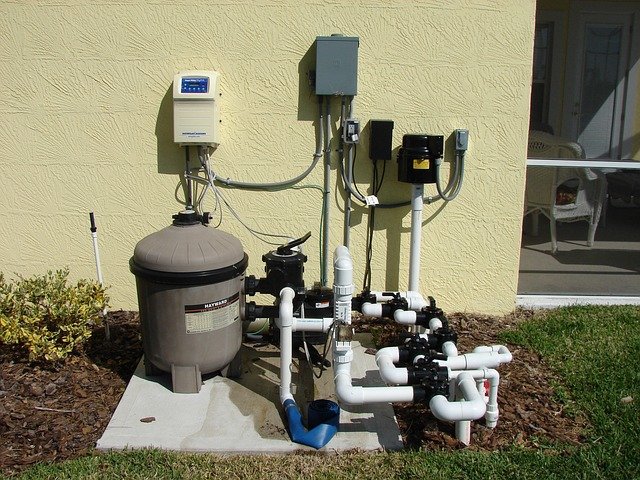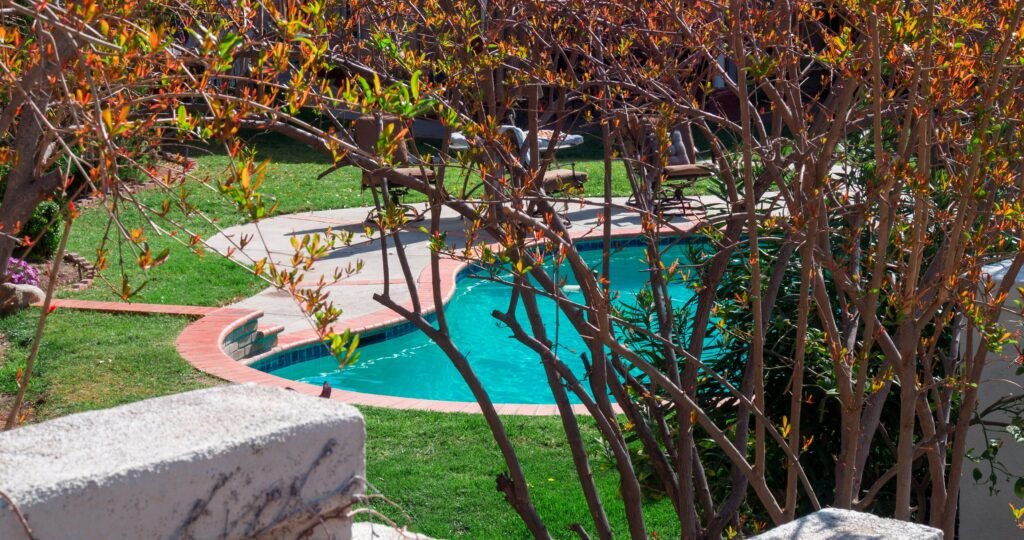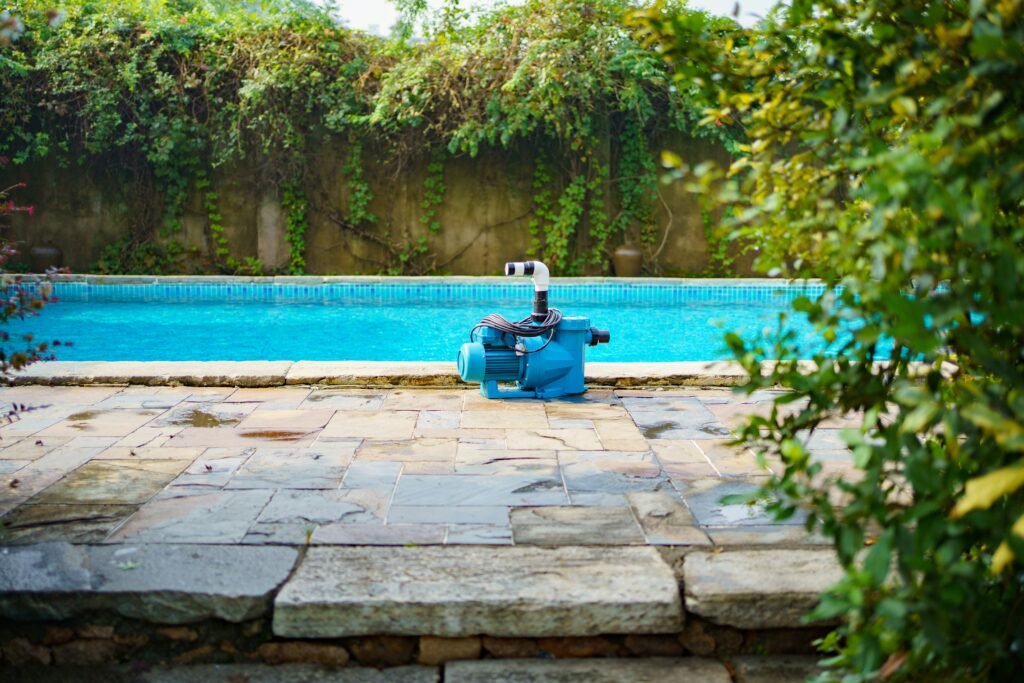If you live next to a neighbor with a swimming pool, you know the sound well.
The constant humming and vibrations from a neighbor’s pool pump motor can disrupt your peace, making it difficult to relax, work, or sleep in your own home. You might feel helpless, wondering if there’s anything you can do to block out the noise without causing tension with your neighbor.
The good news is there are several strategies that can reduce the impact of pool pump noise on your daily life. In this article, we’ll explore various options for soundproofing the pool pump (with your neighbor’s permission), your house, and your yard, as well as tips for having a constructive conversation with your neighbor about the issue.
Understanding Pool Pump Motors
Typical Noise Levels
Pool pump motors can generate significant noise, typically ranging from 65 to 90 decibels (dB) depending on the model and its age. To put this into perspective, a normal conversation is around 60 dB, while a lawnmower can produce about 90 dB. If your neighbor’s pool pump is near your property, you might be bearing the brunt of this noise all summer long.
In general, a pool pump motor can be heard from 50 to 200 feet away, sometimes even further if the noise is particularly loud or if there are no obstructions to block the sound.
Typical Running Times
Pool pumps are usually run for 8 to 12 hours a day, often during daylight hours. However, some pool owners may run their pumps continuously or at night to take advantage of off-peak electricity rates. The duration and timing of pool pump operation can greatly impact the level of noise disturbance experienced by neighbors.
Quieter Pool Pump Options
If your neighbor is open to replacing their current pool pump, there are quieter models available on the market. These include variable speed pumps and those with improved insulation and sound-dampening features. Some of the quietest pool pumps produce noise levels around 45-55 dB, which is a significant reduction compared to standard models.

Soundproofing the Pool Pump
If your neighbor is on board, there are ways to enclose the pool pump to reduce the noise from the motor. Creating soundproof enclosures can be a simple DIY project or a more complex structure built by a professional. The enclosure should be large enough to accommodate the pump and allow for proper ventilation to prevent overheating.
DIY vs. Professional Enclosures
A basic DIY enclosure can be constructed using materials like plywood, medium-density fiberboard (MDF), or mass-loaded vinyl (MLV). However, for the best results, it’s recommended to hire a professional who has experience in building soundproof enclosures. The enclosure must be properly designed, ventilated, and weather-resistant to avoid damage to the pool pump or other pool equipment.
Weather-Resistant Soundproofing Materials
When choosing materials for a pool pump enclosure, consider those with high sound absorption and sound blocking properties. Since the pool pump enclosure will be exposed to the elements, use weather-resistant materials. Look for acoustic foam panels with a protective coating, or consider using outdoor-grade MDF or pressure-treated plywood. Make sure to seal any seams or gaps with a weatherproof sealant to prevent moisture damage, but the enclosure must still have adequate ventilation to prevent the pool pump from overheating.
Vibration-Reducing Pads
Mounting the pool pump on vibration-reducing pads can also help minimize the noise generated by the pump’s vibrations. These pads, made from rubber or other resilient materials, absorb vibrations and prevent them from transferring to the ground or surrounding structures, which is what causes the noise in the first place. This strategy can be used in combination with other soundproofing methods for optimal results.

Soundproofing Your House or Yard
If you remember back to your high school science class, you know sound travels in waves, and some materials are better conductors than others. By employing strategies to block sound waves from reaching your home, you can reduce the impact of your neighbor’s noisy pool pump.
Landscaping for Noise Reduction
Strategically placing trees, shrubs, and other vegetation between your home and the neighbor’s pool pump can help absorb and deflect noise. Evergreen trees and shrubs are particularly effective as they provide year-round noise reduction. Consider planting a mix of tall trees, medium-sized shrubs, and dense groundcover to create a multi-layered noise barrier.
Some of the most effective trees for absorbing sound include cypress, juniper, pine, and spruce. If planting shrubs, consider boxwood, holly, laurel or privet. Ferns, ivy or ornamental grasses might also help, but won’t be as effective as taller trees and shrubs.
Soundproof Windows
Although more expensive, replacing your existing windows with soundproof windows can significantly reduce the amount of pool pump noise you hear from inside your home. Soundproof windows feature thicker glass, improved seals, and specialized frames that work together to block sound transmission. If the pool pump noise is severely impacting your quality of life indoors, it might be worth considering.
Other Soundproofing Techniques
In addition to the methods above, you could try several other techniques to soundproof your house or yard:
- Acoustic fencing: Installing a tall, solid fence made from materials like masonry, brick, or metal can help block pool pump noise from entering your yard.
- Soundproof curtains: Hanging heavy, dense curtains over your windows can help absorb sound and reduce noise transmission into your home.
- Weatherstripping: Sealing gaps around doors and windows with weatherstripping can prevent noise from seeping into your house.
- Insulation: Adding insulation to your walls, attic, and floors can help absorb sound and reduce overall noise levels in your home.
If the pool pump noise is particularly bothersome indoors, noise-canceling headphones or a white noise machine can help mask the sound. Noise-canceling headphones work by actively counteracting external noise, while white noise machines produce a consistent background sound that helps cover up unwanted noise. These solutions are most effective for personal use in specific rooms, such as bedrooms or home offices.

Talking With Your Neighbor
If you’re going to have any luck convincing your neighbor to do something about the pool pump motor noise, it’s critical to approach the issue in a friendly, tactful manner. Choose a time and place when you’re both relaxed, free and un-stressed to broach the conversation.
Be open to compromises that can help reduce the impact of the pool pump noise on your daily life. For example, you could ask your neighbor to run the pump during specific hours when you’re less likely to be home or outdoors. Alternatively, you could offer to split the cost of a quieter pool pump or soundproofing materials if your neighbor is open to making changes.
If the pool pump is located close to your property line or in an area that amplifies the noise, you could also suggest that your neighbor consider relocating the pump to the opposite side of the pool or placing it in a more central location away from neighboring homes. Keep in mind, this option won’t be easy — or likely cheap — and may involve re-routing plumbing. If you’re going to suggest this, be prepared to offer to help offset the cost, and be aware that it might not fully solve your issue.

